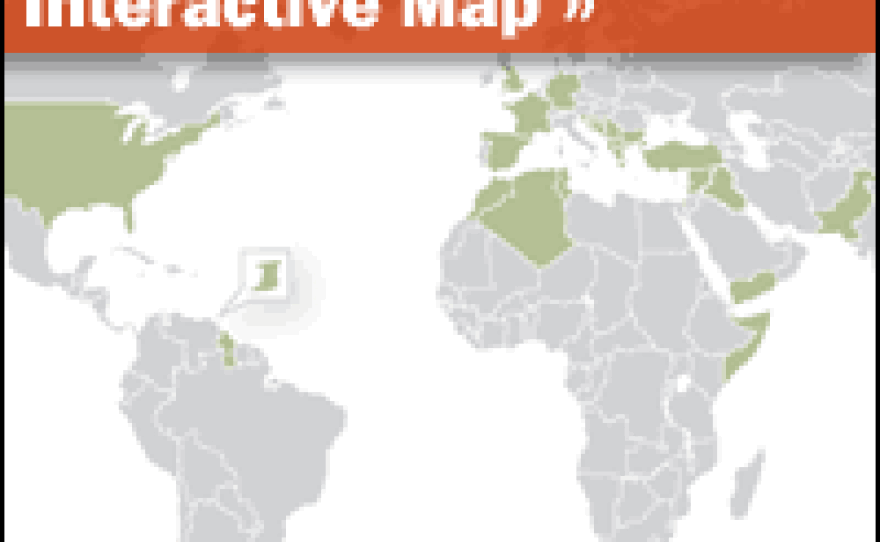

Six years after the Sept. 11 attacks, there have been wars in Iraq and Afghanistan; sweeping reforms of U.S. intelligence and domestic security operations; and hundreds of billions of dollars spent overseas on what has come to be known as the war on terror.
Yet, the threat from al-Qaida remains grave.
U.S. intelligence officials speak of a terror network that is far from declining and, in fact, appears to be gaining strength.
Six years ago, al-Qaida was a shadowy terrorist network bent on attacking the U.S. It was led by two men — Osama bin Laden and Ayman al-Zawahiri — who were hiding along the Afghanistan-Pakistan border.
Now, the broad outlines of the threat look pretty much the same. In the two videos bin Laden released to commemorate the Sept. 11 anniversary, bin Laden's beard may be blacker, but his hatred of the United States is clearly undiminished.
Bin Laden declares that U.S. policy in Iraq has failed. The Bush administration dismissed the tape. On Fox News last weekend, White House adviser Frances Fragos Townsend suggested bin Laden is not capable of much beyond bluster these days.
"This is about the best he can do," she said. "This is a man on the run from a cave who is virtually impotent other than these tapes."
But others disagree.
"Frankly, I think Ms. Townsend is trying to give us a spin, to explain why this president took his eye off the ball, and failed to kill this man or bring him to justice, when he had the opportunity," said Bruce Riedel, former CIA officer and National Security Council staffer.
He argued bin Laden and his deputies today are far from "impotent."
"Every major terrorist operation in the United Kingdom, over the last five years — including the July 2005 attack on the London subways and last year's plot, which was thwarted before it was able to destroy 10 jumbo jets over the north Atlantic — was linked back to al-Qaida in Pakistan and to the senior leadership of al-Qaida in Pakistan," Riedel said.
That pattern was apparent last week when officials in both Denmark and Germany announced they had thwarted bomb plots and arrested men with suspected ties to al-Qaida.
Wolfgang Schaeuble, Germany's interior minister, told reporters the three men arrested there trained at a camp in Pakistan.
According to a National Intelligence Estimate completed this summer, al-Qaida has rebuilt a safe haven inside Pakistan. The terrorist network remains determined to attack the U.S. and would like to use chemical, biological or nuclear weapons to do so.
"We assess, with high confidence, that al-Qaida is focusing on targets that would produce mass casualties, dramatic destruction and significant economic aftershocks," CIA Director Gen. Michael warned five days ago.
National intelligence director Mike McConnell told Congress Monday that, while al-Qaida has rebuilt, the group is still not as strong as it was on Sept. 11, 2001. That is the argument President Bush has made when confronted with evidence of a revitalized al-Qaida.
"Al-Qaida is, would have been, a heck of a lot stronger today had we not stayed on the offense," President Bush said. "And it's in the interests of the United States to not only defeat them overseas, so we don't have to face them here, but also to spread an ideology that will defeat their ideology every time."
Defeating the terrorists overseas, so we don't have to face them here is a favorite refrain of the president. He has used it to defend ongoing U.S. military operations in Iraq.
But former senior CIA analyst Paul Pillar says it is misleading. "It's as if terrorists were polite enough to, you know, have the courtesy to fight us only one place at time. They aren't like that," he said.
Riedel is also skeptical of the administration's claims of progress in the war on terror. He noted that, while there was progress right after Sept. 11, no senior al-Qaida leaders have been killed or captured in Pakistan in more than a year.
Riedel also said that al-Qaida's media wing has released at least 10 tapes this year and has succeeded at launching new franchise groups across the Middle East.
"There's one in Iraq that's extremely deadly. There's another one in Saudi Arabia, which looks to be temporarily in eclipse, but which I wouldn't rule out coming back big time in the future. And there's a stronger and more deadly one now in North Africa," Riedel said.
Last week, al-Qaida in the Islamic Maghreb tried to assassinate Algerian President Abdelaziz Bouteflika.
Riedel said there are now smaller al-Qaida franchises popping up across Europe and that is the sign of an enemy that is today more determined and deadly than ever.
Copyright 2022 NPR. To see more, visit https://www.npr.org. 9(MDAzMjM2NDYzMDEyMzc1Njk5NjAxNzY3OQ001))






